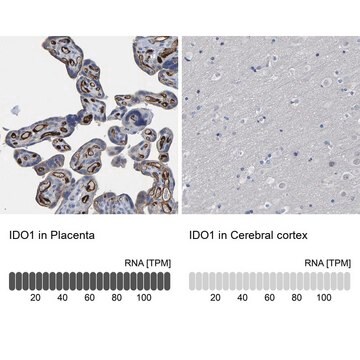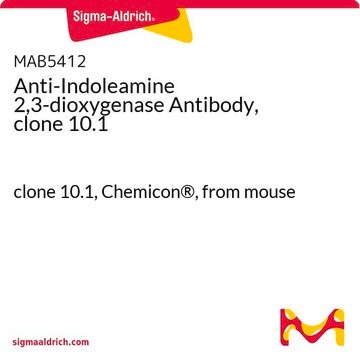MABF850
Anti-IDO-1 Antibody, clone 4B7 | MABF850
clone 4B7, from mouse
Synonym(e):
Indoleamine 2,3-dioxygenase 1, IDO-1, Indoleamine-pyrrole 2,3-dioxygenase
About This Item
Empfohlene Produkte
Biologische Quelle
mouse
Qualitätsniveau
Antikörperform
purified immunoglobulin
Antikörper-Produkttyp
primary antibodies
Klon
4B7, monoclonal
Speziesreaktivität
mouse, rat
Methode(n)
immunohistochemistry: suitable (paraffin)
western blot: suitable
Isotyp
IgG1κ
NCBI-Hinterlegungsnummer
UniProt-Hinterlegungsnummer
Versandbedingung
wet ice
Posttranslationale Modifikation Target
unmodified
Angaben zum Gen
mouse ... Ido1(15930)
Allgemeine Beschreibung
Spezifität
Immunogen
Anwendung
Immunohistochemistry Analysis: A representative lot detected IDO-1 immunoreactivity in acetone-fixed frozen colon tissue sections from wild-type, but not Ido1-knockout mice (Courtesy of Dr. Sunil Thomas, Lankenau Institute for Medical Research, Wynnewood, PA).
Immunofluorescence Analysis: A representative lot detected IDO-1 immunoreactivity in acetone-fixed frozen colon and epididymis tissue sections from wild-type, but not Ido1-knockout mice by fluorescent immunohistochemistry (Courtesy of Dr. Sunil Thomas, Lankenau Institute for Medical Research, Wynnewood, PA).
Western Blotting Analysis: A representative lot detected IDO-1 in epididymis and colon tissue extracts from wild-type, but not Ido1-knockout mice (Thomas, S., et al. (2014). J. Cell. Biochem. 115(2):391-396).
Immunohistochemistry Analysis: A representative lot detected IDO-1 immunoreactivity in multiple acetone-fixed frozen tissue sections from wild-type, but not Ido1-knockout mice, including epididymis, colon, heart, liver, and 4T1-metastasized lung tissue sections (Thomas, S., et al. (2014). J. Cell. Biochem. 115(2):391-396).
Qualität
Immunohistochemistry Analysis: A 1:50 dilution of this antibody detected IDO-1 in mouse kidney tissue.
Zielbeschreibung
Physikalische Form
Sonstige Hinweise
Sie haben nicht das passende Produkt gefunden?
Probieren Sie unser Produkt-Auswahlhilfe. aus.
Lagerklassenschlüssel
12 - Non Combustible Liquids
WGK
WGK 1
Flammpunkt (°F)
Not applicable
Flammpunkt (°C)
Not applicable
Analysenzertifikate (COA)
Suchen Sie nach Analysenzertifikate (COA), indem Sie die Lot-/Chargennummer des Produkts eingeben. Lot- und Chargennummern sind auf dem Produktetikett hinter den Wörtern ‘Lot’ oder ‘Batch’ (Lot oder Charge) zu finden.
Besitzen Sie dieses Produkt bereits?
In der Dokumentenbibliothek finden Sie die Dokumentation zu den Produkten, die Sie kürzlich erworben haben.
Unser Team von Wissenschaftlern verfügt über Erfahrung in allen Forschungsbereichen einschließlich Life Science, Materialwissenschaften, chemischer Synthese, Chromatographie, Analytik und vielen mehr..
Setzen Sie sich mit dem technischen Dienst in Verbindung.








